| Srl | Item |
| 1 |
ID:
145401
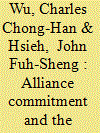

|
|
|
|
|
| Summary/Abstract |
Our study shows that alliance commitment is the key to the maintenance of the status quo between a weak challenger and a major-power attacker. In order to verify our theory, we employ data from Benson's typology of compellent military alliances and conduct empirical tests for our theoretical hypothesis. The statistical results comply with the theory, indicating that a trustful and strong military commitment creates negative effects on the status quo. We examine the cases of the Korean War and US-China-Taiwan relations to buttress our arguments. The latter case also shows the need to modify our original model under certain conditions.
|
|
|
|
|
|
|
|
|
|
|
|
|
|
|
|
| 2 |
ID:
092637
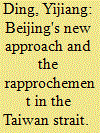

|
|
|
| 3 |
ID:
142333
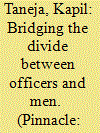

|
|
|
| 4 |
ID:
152279


|
|
|
|
|
| Summary/Abstract |
This article refutes the widely-speculated claims that China’s charm offensive aims to drive a wedge between South Korea and the United States to pull the former closer to its side. South Korea, at least in theory, remains unswayed and can hold its posture, recognising an important strategic factor that interstate diplomacy is interest-driven. China’s relations with South Korea are largely economics-driven. Economic motivations have compromised China’s and South Korea’s development of bilateral relations in the realm of hard politics, even though China is entirely cognizant of the North Korean factor, and of the diverging values that both countries uphold.
|
|
|
|
|
|
|
|
|
|
|
|
|
|
|
|
| 5 |
ID:
173979
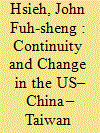

|
|
|
|
|
| Summary/Abstract |
The relations between China and Taiwan (cross-Strait relations) have been a thorny issue for all parties concerned. These relations are one of the flashpoints in the world, which may trigger a serious military conflict. They involve not only China and Taiwan but also the United States. The purpose of this paper is to account for the trajectory of this triangular relationship with the help of opinion surveys in Taiwan. It is shown that when the Kuomintang (KMT) gains the governing power in Taiwan, Taiwan is the median voter in the cross-Strait relations game at the international level while as a non-traditional KMT or the Democratic Progressive Party is in power, it is the US that turns out to be the median voter.
|
|
|
|
|
|
|
|
|
|
|
|
|
|
|
|
| 6 |
ID:
113043
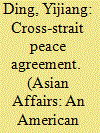

|
|
|
|
|
| Publication |
2012.
|
| Summary/Abstract |
In spite of the fact that substantial progress has been made in the improvement of relations between China and Taiwan, 1
there have been no talks on sensitive political issues. Beijing's proposal for a cross-strait peace agreement is put on hold. Disagreement over the sovereignty of one China and the political reality in Taiwan have conspired to create an apparent impasse and contributed to an indefinite delay of the negotiations. At the moment, a large section of Taiwanese people do not seem to want this peace agreement. The ruling Chinese Nationalist Party (KMT) cannot afford to start negotiations without a strong domestic consensus. This article examines the political situation in Taiwan, analyzes the main obstacles to reaching a cross-strait peace agreement, and explores possible solutions.
|
|
|
|
|
|
|
|
|
|
|
|
|
|
|
|
| 7 |
ID:
145571
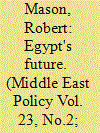

|
|
|
| 8 |
ID:
187431
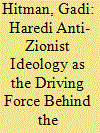

|
|
|
|
|
| Summary/Abstract |
Since its establishment as an independent state, Israel has witnessed waves of protests, sometimes violence, from the Haredi (ultraorthodox) community. Focusing on clashes between Haredi protesters and the police from 2000 onward, this study suggests a new theoretical explanation for Haredi protests and violent activities. By using a mixture of the following three major theories—primordial, constructivism, and contingency—the article provides a new model for analyzing Haredi patterns of confrontation with the Israeli authorities. It concludes, inter alia, that the Haredi community is a permanent passive protest movement that responds, usually immediately, to official initiatives to change the status quo involving the state, politics, society, and religion in Israel.
|
|
|
|
|
|
|
|
|
|
|
|
|
|
|
|
| 9 |
ID:
145142
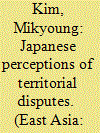

|
|
|
|
|
| Summary/Abstract |
This article examines the causal associations between domestic Japan’s socio-psychological indices and people’s perceptions toward territorial disputes with China and South Korea. The triangulation analyses do not support most of the hypotheses except the explanatory variables of age, level of educational attainment, and Japan’s future projection: The higher the age group, the stronger the territorial sovereignty conviction; the higher the level of education, the weaker the support for the Japanese government’s hawkish policy; and the more pessimistic the future confidence of Japan, the bigger the threat perception of China. The causality could be established only when the probability level was relaxed from 0.05 to 0.10. This research finds a weak overall causal association between domestic state of affairs and territorial perceptions. The public opinion on territorial claims remains more or less the same largely independent of domestic socio-economic conditions. This observation leads to a call to revise the conventional conflict cycle theory (i.e., status quo > provocation > rise of tension > conflict relaxation) in order to reflect more of simultaneous and interactive nature of inter-state conflict (i.e., action [tension/status quo/reconciliation] > reaction [tension/status quo/reconciliation]). The intra-state affairs have become more vulnerable to unexpected and hard-to-control contingencies which defy the procedural progression of conflict management. This implies that the elites can no longer monopolize the decision on foreign affairs.
|
|
|
|
|
|
|
|
|
|
|
|
|
|
|
|
| 10 |
ID:
148538
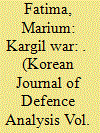

|
|
|
|
|
| Summary/Abstract |
In the winter of 1998-99, the inexplicable presence of Pakistani troops under the pretext of being local freedom fighters in the Indian-administered side of Kashmir brought the region to the brink of a nuclear war. This paper probes the military rationale behind Pakistan`s initiative, organizational interests, internal politicking among different state organs, and the role of a few powerful individuals in the operation. It takes into account the important dimensions of strategy employed during the preparations for the Kargil War and the errors on the part of Pakistani planners which if addressed could have reversed the outcome of the operation. The controversies surrounding the Kargil conflict are discussed through the works of academicians and memoirs of the military commanders from India and Pakistan. The first part of the paper focuses on the rivalry and causes of the outbreak of war between India and Pakistan by explaining the beliefs and psychology of the military planners based on the premise of Cashman and Robinson. The second part reviews the political and nuclear milieu in which the conflict took place, while the third part accounts for the international efforts to prevent the conflict from escalating. The fourth part draws conclusions from the entire episode, indicating the discrepancies on both sides and the evidence that Kargil was unique because it challenged the military logics.
|
|
|
|
|
|
|
|
|
|
|
|
|
|
|
|
| 11 |
ID:
146896
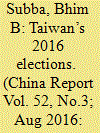

|
|
|
|
|
| Summary/Abstract |
This article examines the recent Presidential and Legislative Yuan (LY, 立法院) elections in Taiwan. The Democratic Progressive Party (DPP) swept elections at both levels. Its candidate was elected as the island’s first female president. On the other hand, the ruling Kuomintang (KMT) lost its majority in the legislature for the first time since competitive electoral democracy began in Taiwan. These elections saw a change in the agenda of the major parties, especially that of the DPP, on various domestic and external issues. At the same time, the growth of student and civil society movements and their participation in the political arena since the 2014 Sunflower movement have carved out a niche in Taiwanese politics today. This article offers some preliminary comments on the significance and impact of the elections on Taiwan’s changing domestic and political landscape, with the emergence of new political forces and socio-economic challenges, along with nebulous Cross–Strait relations and ‘shrinking’ international space and diplomacy. How TsaiIng-wen’s administration after 20 May will deal with these intricate issues will be a test for her presidency.
|
|
|
|
|
|
|
|
|
|
|
|
|
|
|
|
| 12 |
ID:
175769


|
|
|
|
|
| Summary/Abstract |
The Trump plan empowers forces working to shatter the ban on non-Muslim worship on the site and increases the possibility of another episode of nationally or religiously motivated violence in Jerusalem, further deepening the intractability of the broader conflict.
|
|
|
|
|
|
|
|
|
|
|
|
|
|
|
|